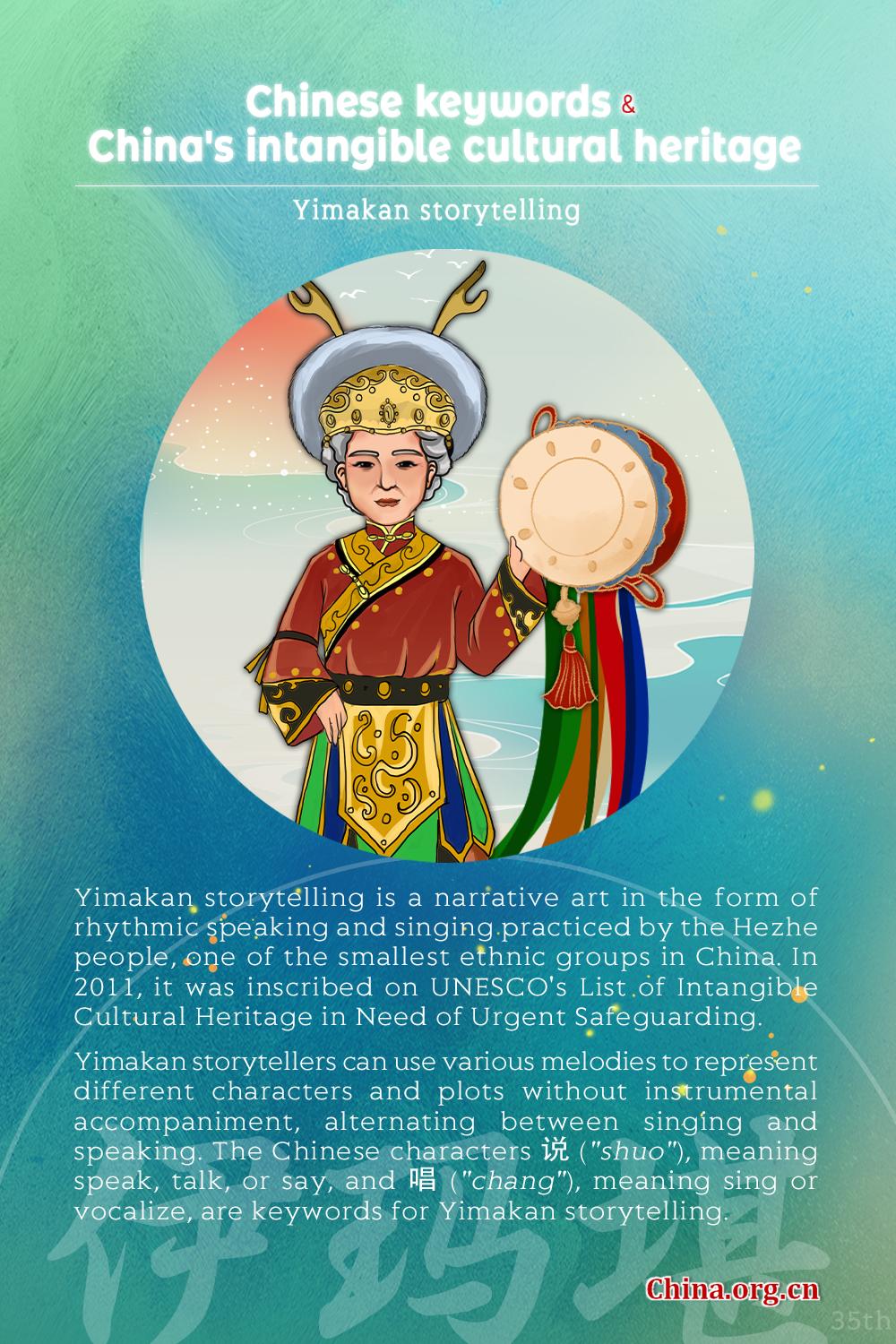Yimakan storytelling and its Chinese keywords
- By Zhou Jing
 0 Comment(s)
0 Comment(s) Print
Print E-mail China.org.cn, September 28, 2023
E-mail China.org.cn, September 28, 2023
Editor's note: Yimakan storytelling is a narrative art in the form of rhythmic speaking and singing practiced by the Hezhe people, one of the smallest ethnic groups in China. In 2011, it was inscribed on UNESCO's List of Intangible Cultural Heritage in Need of Urgent Safeguarding.

Yimakan storytellers can use various melodies to represent different characters and plots without instrumental accompaniment, alternating between singing and speaking. The Chinese characters 說 ("shuo"), meaning speak, talk, or say, and 唱 ("chang"), meaning sing or vocalize, are keywords for Yimakan storytelling.
The Hezhe people originated from an ancient clan with a history of 6,000-7,000 years, and live mainly along three rivers, the Heilongjiang, Songhuajiang and Wusulijiang rivers in northeastern China. They traditionally depend mostly on fishing and hunting for their livelihoods, which contribute significantly to the Yimakan storytelling art.
Long or short Yimakan stories, with both verses and proses in their independent episodes, generally focus on three themes: ancient shaman culture and rituals, heroic and legendary stories depicting tribal alliances and battles, including the defeat of monsters and invaders, and people's daily fishing and hunting life.
In the past, Yimakan storytelling was closely connected with the life of the Hezhe people, hence becoming a vital carrier of their language, religion, beliefs, legends, customs and history. However, this time-honored oral tradition gradually lost its prominence due to factors such as a small population, lack of a written form, limited performing opportunities, and the huge changes in modern society.
Before the founding of the People's Republic of China in 1949, there were only about 300 Hezhe people. Today, there are now over 5,000. However, passing down the tradition of Yimakan storytelling remains challenging. Yimakan storytellers are highly respected as the only ones with the necessary language skills and quick enough mind to master the art. There were more than 10 storytellers in the 1950s, and this number dwindled to just three or four during the 1960s and '70s. From the 1980s to '90s, the five remaining storytellers struggled to perform the long classics. Since then, China has taken more steps to protect the tradition.
In 2015, a set of research books on Yimakan was published in China, including 48 classic stories and more than 300 precious pictures. More than 2.3 million words in length, the books focus on Yimankan's long history, performing patterns, and cultural values, as well as its inheritance, development, and protection.
Yimakan storytelling has an irreplaceable social function, enhances ethnic unity and identity, and also serves as a treasure trove of the Hezhe language that belongs to the Manchu-Tungusic branch of the Altaic language family. As UNESCO states, this oral heritage "is essential to the worldview and historical memory of the Hezhe ethnic minority." It highlights the protection of ethnic identity and territorial integrity, and preserves knowledge of shamanic rituals, fishing, and hunting.
Find out more about China's intangible cultural heritage and their keywords:
China's 43rd UNESCO's ICH element: Traditional tea processing
China's 42nd UNESCO's ICH element: Wangchuan ceremony
China's 41st UNESCO's ICH element: Taijiquan
China's 40th UNESCO's ICH element: Lum medicinal bathing of Sowa Rigpa
China's 39th UNESCO's ICH element: Twenty-Four Solar Terms
China's 38th UNESCO's ICH element: Abacus-based Zhusuan
China's 37th UNESCO's ICH element: Training plan for Fujian puppetry performers




